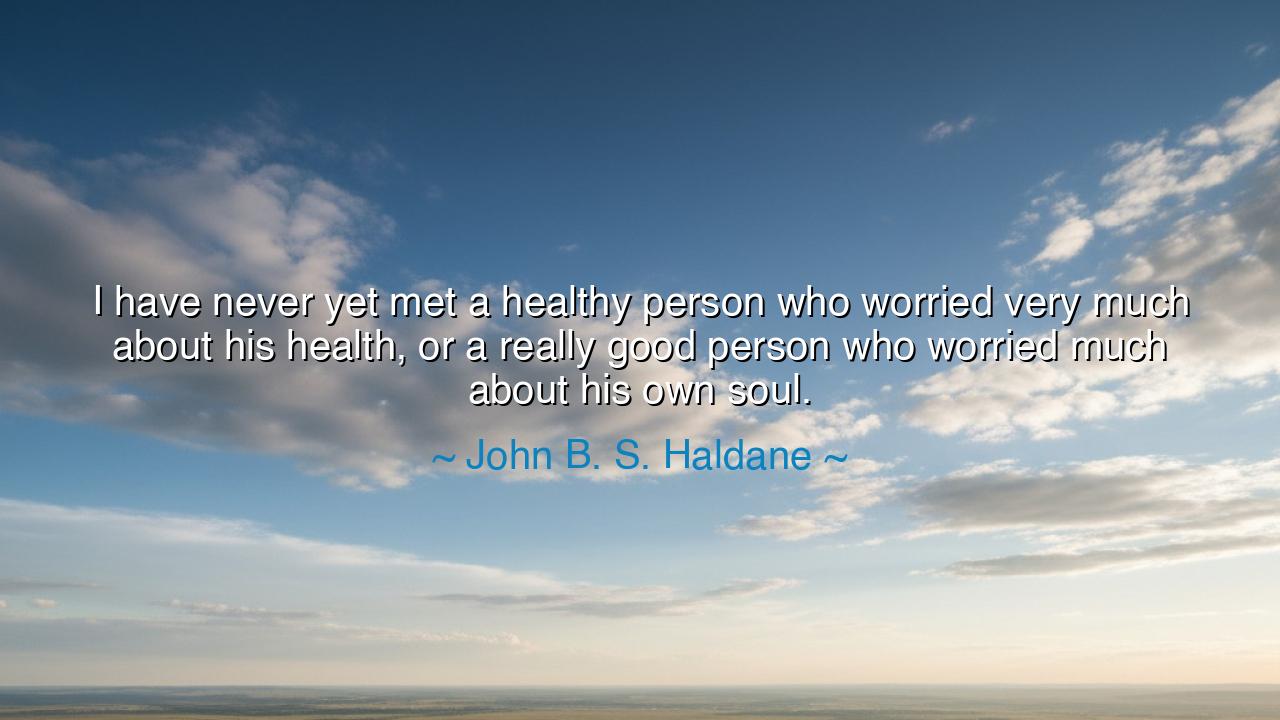
I have never yet met a healthy person who worried very much about
I have never yet met a healthy person who worried very much about his health, or a really good person who worried much about his own soul.






In the discerning and timeless words of John B. S. Haldane, the philosopher-scientist who bridged the realms of reason and wonder, we are offered a profound insight into the nature of true health and genuine goodness: “I have never yet met a healthy person who worried very much about his health, or a really good person who worried much about his own soul.” Beneath the simplicity of these words lies an eternal truth — that wholeness, whether of body or of spirit, is not born from worry, but from harmony. The man who is truly well does not obsess over his body, for health is not the result of anxiety but of natural balance; and the person who is truly good does not constantly measure his virtue, for goodness arises not from self-conscious striving but from purity of heart.
Haldane, a biologist and philosopher of the early twentieth century, was a man who understood the subtle dance between life and thought. In his time, science was lifting the veil from nature, revealing its intricate laws. Yet even amid his empirical pursuits, he perceived a moral order in the universe — one that joined the physical with the spiritual. His words remind us that health and virtue are not trophies to be seized, but states of being that flow from right living. The healthy person eats, moves, and rests in rhythm with nature; the good person acts kindly without calculation. It is only when we fall out of balance that we begin to brood over ourselves — to obsess, to measure, to fear.
In the ancient world, the sages of both East and West spoke of this same truth. The Greek physician Hippocrates, father of medicine, taught that health was not merely the absence of disease but the harmony of the four elements within the body. When this harmony was achieved, the body flourished naturally; there was no need to fret or strive. Likewise, in the East, the Taoist masters said that the wise man does not force virtue upon himself; he acts in accordance with the Tao, and goodness flows as water flows downhill — effortlessly, silently, inevitably. The worry about health or righteousness, they warned, is a sign of imbalance — of the mind meddling where the spirit should guide.
Consider the story of Siddhartha Gautama, the man who became the Buddha. In his youth, he sought purity through self-denial, starving and punishing his body in the belief that suffering would make him holy. But he found that such obsession only weakened him. It was only when he released his worry — when he sat beneath the Bodhi tree and embraced the Middle Way — that enlightenment dawned. His body grew strong, his mind clear, and his soul serene. He discovered, as Haldane later would echo, that both health and goodness come not from struggle, but from peace — from the natural alignment of body, mind, and spirit.
There is deep irony in our modern age: never before have people spoken so much of health, yet been so unhealthy; never have they debated goodness so fiercely, yet felt so divided within. We count our calories and tally our steps, yet forget the joy of movement. We proclaim virtue and purity, yet measure it against the failures of others. In doing so, we fall into the very trap Haldane warns against — mistaking worry for wisdom, and obsession for care. True health and true goodness are quiet forces; they do not shout, they do not boast, and they do not tremble before the mirror of self-judgment.
The lesson, therefore, is one of trust and balance. Live well, but without fear. Care for your body through moderation and gratitude, not through anxiety. Tend to your soul through kindness and honesty, not through self-condemnation. When the gardener loves his plants, he does not pull at their roots each morning to see if they are growing — he waters them, gives them sunlight, and trusts the process. So must we live: gently, steadily, without constant scrutiny, allowing health and goodness to arise of their own accord.
Let this teaching guide all who hear it: cease to chase what should come naturally. When your heart is clear, you will act with virtue; when your life is balanced, your body will thrive. The truly healthy do not fear sickness, for their peace keeps them strong; the truly good do not fear sin, for their hearts dwell in light. Live, then, as one who is already whole — not through restless striving, but through the quiet art of being.
And so, as Haldane teaches, remember this truth: Health and goodness are not achieved through worry, but through wisdom. Walk lightly, eat simply, think kindly, and let your soul rest in the calm assurance that life, when honored, will care for you as faithfully as you care for it. For the man who trusts the harmony of existence will find both health in his body and peace in his soul — without ever needing to worry for either.






AAdministratorAdministrator
Welcome, honored guests. Please leave a comment, we will respond soon